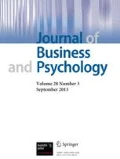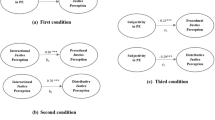Abstract
Purpose
The purpose of this study was to examine employees’ reactions to the use of organizational citizenship behavior (OCB) in performance evaluations. In addition, gender differences in such reactions were examined.
Design/methodology/approach
Data were obtained from a sample of working adults (n = 78) and a sample of students (n = 249). In the first study, participants compared the fairness of 11 different weighting combinations of OCB and core task behavior, using a within-subjects design. In the second study, low, medium, and high weightings of OCB were compared using a between-subjects design.
Findings
In both studies, participants reported that evaluating employees on OCB was fair. OCB weightings of 30– 50% were perceived as the most fair. Men felt that OCB weighting of 20–30% were the most fair and women felt that OCB weightings of 25–50% were the most fair.
Implications
Considering that employees are evaluated on their OCB, it is important to know that they feel that it is fair to do so. Choosing how heavily to weigh OCB may be more difficult, although weightings of 25–30% OCB were perceived to be fair to both the men and women in this research.
Originality/value
This is the first study to examine employee reactions to the use of OCB in performance evaluations and add to a growing body of evidence suggesting that there are gender differences in the perceptions of OCB.



Similar content being viewed by others
References
Allen, T. D., & Rush, M. C. (1998). The effects of organizational citizenship behavior on performance judgments: A field study and laboratory experiment. Journal of Applied Psychology, 83, 247–260.
Allen, T. D., & Rush, M. C. (2001). The influences of ratee gender on organizational citizenship behavior. Journal of Applied Social Psychology, 31, 2561–2587.
Blau, P. (1964). Exchange and power in social life. New York: Wiley.
Borman, W. C., White, L. A., & Dorsey, D. W. (1995). Effects of ratee task performance and interpersonal factors on supervisors and peer performance ratings. Journal of Applied Psychology, 80, 168–177.
Colquitt, J. A. (2001). On the dimensionality of organizational justice: A construct validation of a measure. Journal of Applied Psychology, 86, 386–400.
Colquitt, J. A., Conlon, D. E., Wesson, M. J., Porter, C. O. L. H., & Yee Ng, K. (2001). Justice at the millennium: A meta-analytic review of 25 years of organizational justice research. Journal of Applied Psychology, 86, 425–445.
Coyle-Shapiro, J. A.-M. (2002). A psychological contract perspective on organizational citizenship behavior. Journal of Organizational Behavior, 23, 927–946.
Coyle-Shapiro, J. A.-M., Kessler, I., & Purcell, J. (2004). Exploring organizationally directed citizenship behaviour: Reciprocity or ‘It’s my job’? Journal of Management Studies, 41, 85–106.
Eagly, A. H. (1987). Sex differences in social behavior: A social-role interpretation. Hillsdale, NJ: Erlbaum.
Ehrhart, M. G. (2004). Leadership and procedural justice climate as antecedents of unit-level organizational citizenship behavior. Personnel Psychology, 57, 61–94.
Fodchuk, K. M. (2007). Work environments that negate counterproductive behaviors and foster organizational citizenship: Research-based recommendations for managers. The Psychologist—Manager Journal, 10, 27–46.
Gelfand, M. J., Erez, M., & Aycan, Z. (2007). Cross-cultural organizational behavior. Annual Review of Psychology, 58, 479–514.
Gouldner, A. W. (1960). The norm of reciprocity. American Sociological Review, 25, 161–178.
Guest, D. E. (1998). Is the psychological contract worth taking seriously? Journal of Organizational Behavior, 19, 649–664.
Halverson, S. K., & Holladay, C. L. (2004). Mood at work, transformational leadership, and organizational citizenship behavior: Testing an integrative model. A paper presented at the Annual Conference for the Academy of Management, New Orleans, Louisiana.
Holladay, C. L., Halverson, S. K., Strong, M. H., Quiñones, M. A., & Caplinger, J. A. (2004). Organizational Citizenship Behavior and Salary: The Moderating Effects of Employee Race, Gender, and Job Level. A paper presented at the 19th Annual Conference of the Society of Industrial-Organizational Psychology, Chicago, Illinois.
Johnson, J. (2001). The relative importance of task and contextual performance dimensions to supervisor judgments of overall performance. Journal of Applied Psychology, 86, 984–996.
Johnson, S. K. (2008). I second that emotion: Effects of emotional contagion and affect at work on leader and follower outcomes. The Leadership Quarterly, 19, 1–19.
Kidder, D. L. (2002). The influence of gender on the performance of organizational citizenship behaviors. Journal of Management, 28, 629–648.
Kidder, D. L., & McLean Parks, J. (2001). The good soldier: Who is s(he)? Journal of Organizational Behavior, 22, 939–959.
Lovell, S. E., Kahn, A. S., Anton, J., Davidson, A., Dowling, E., Post, D., et al. (1999). Does gender affect the link between organizational citizenship behavior and performance evaluation? Sex Roles, 41, 469–478.
MacKenzie, S. B., Podsakoff, P. M., & Fetter, R. (1991). Organizational citizenship behavior and objective productivity as determinants of managerial evaluations of salesperson’s performance. Organizational Behavior and Human Decision Processes, 50, 123–150.
Milkovich & Newman. (2002). Compensation, 7th Edition. Chapter 11: Performance Appraisals.
Morrison, E. W. (1994). Role definitions and organizational citizenship behavior: The importance of the employees’ perspective. Academy of Management Journal, 37, 1543–1567.
Motowidlo, S. J., & Van Scotter, J. R. (1994). Evidence that task performance should be distinguished from contextual performance. Journal of Applied Psychology, 79, 475–480.
Organ, D. W. (1988). Organizational citizenship behavior: The good soldier syndrome. Lexington, MA: Lexington Books.
Organ, D. W. (1997). Organizational citizenship behavior: It’s construct clean-up time. Human Performance, 10, 85–97.
Orr, J. M., Sackett, P. R., & Mercer, M. (1989). The role of prescribed and nonprescribed behaviors in estimating the dollar value of performance. Journal of Applied Psychology, 74, 34–40.
Pond, S. B., Nacoste, R. W., Mohr, M. F., & Rodriguez, C. M. (1997). The measurement of organizational citizenship behavior: Are we assuming too much? Journal of Applied Social Psychology, 27, 1527–1544.
Rotundo, M., & Sackett, P. R. (2002). The relative importance of task, citizenship, and counterproductive performance: A policy-capturing approach. Journal of Applied Psychology, 87, 66–80.
Smith, C. A., Organ, D. W., & Near, J. P. (1983). Organizational citizenship behavior: Its nature and antecedents. Journal of Applied Psychology, 68, 653–663.
Werner, J. M. (1994). Dimensions that make a difference: Examining the impact of in-role and extrarole behaviors on supervisory ratings. Journal of Applied Psychology, 79, 98–107.
Witt, L. A., Kacmar, M., Carlson, D. S., & Zivnuska, S. (2002). Interactive effects of personality on contextual performance. Journal of Organizational Behavior, 23, 911–926.
Author information
Authors and Affiliations
Corresponding author
Additional information
Received and reviewed by former editor, George Neuman.
Appendix: Scenario 1
Appendix: Scenario 1
Company A weights organizational citizenship behaviors 100% and core task behaviors 0% in determining employees overall performance level. By doing so, employees are then ranked according to their level of performance on the two work behaviors.
OCB = 100 | CTB = 0 | Score | Ranking | |
|---|---|---|---|---|
Person A | 1 = Low | 1 = Low | 100 | 3 |
Person B | 1 = Low | 2 = Average | 100 | 3 |
Person C | 1 = Low | 3 = High | 100 | 3 |
Person D | 2 = Average | 1 = Low | 200 | 2 |
Person E | 2 = Average | 2 = Average | 200 | 2 |
Person F | 2 = Average | 3 = High | 200 | 2 |
Person G | 3 = High | 1 = Low | 300 | 1 |
Person H | 3 = High | 2 = Average | 300 | 1 |
Person I | 3 = High | 3 = High | 300 | 1 |
Strongly disagree | Neutral | Strongly agree | ||
|---|---|---|---|---|
1 | 2 | 3 | 4 | 5 |
-
—1. These rankings are fair.
-
—2. The rankings reflect the effort the employees have put into their work.
-
—3. The rankings are appropriate for the work behaviors the employees have completed.
-
—4. The rankings reflect what the employees have contributed to the organization.
-
—5. The rankings are justified, given the employees’ performances.
Rights and permissions
About this article
Cite this article
Johnson, S.K., Holladay, C.L. & Quinones, M.A. Organizational Citizenship Behavior in Performance Evaluations: Distributive Justice or Injustice?. J Bus Psychol 24, 409–418 (2009). https://doi.org/10.1007/s10869-009-9118-0
Published:
Issue Date:
DOI: https://doi.org/10.1007/s10869-009-9118-0




